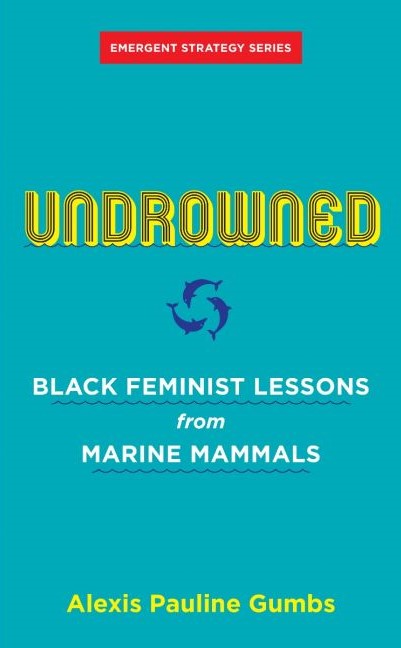
Undrowned
Undrowned: Black Feminist Lessons from Marine Mammals by Alexis Pauline Gumbs is one of the strangest books I have read recently – and I mean that in an extremely positive way. I admit I had to get into it first, but then this unusual way of talking about dolphins, whales, seals and co. in connection with Black experiences won me over. The chapters have titles like “Breathe”, “Be Vulnerable” and “End Capitalism”. Activist and spiritual threads run through the book, and it exercises critique – but its focus is on love and healing.
Gumbs lives in Durham in the USA and describes herself as a “Queer Black Troublemaker”. Her writing is experimental. In Undrowned, the transatlantic trade in enslaved people serves as her starting point. The horrifying conditions under which white colonists trafficked Africans across the Atlantic to the Americas cost many their lives. Gumbs calls those who survived the undrowned. She grapples with the consequences of this collective experience by reflecting on the characteristics and behaviours of marine mammals. She mentions that she has consulted natural history manuals – a standardised kind of knowledge – but then finds her own unique language and narrative about these animals, drawing particularly on Black knowledge production. For example, Gumbs tells of the Caribbean monk seals, which experienced genocide with the arrival of Columbus but maintained a calm, strong demeanour. Or she tells of the spotted dolphin, which strategically employs evasion to protect itself, thus puzzling scientists – spotted dolphins are not easily classified and categorised. Gumbs attributes a role model quality to these characteristics; humans can learn from them, especially when they are affected by systemic oppression.
Gumbs also talks about different kinds of relationships, motherhood and care. She questions what people attribute to each other and what they attribute to animals. For example, “out in the ocean … it is not considered queer for bottlenose dolphins, designated as male by scientists, to live in partnerships for decades” (123). Gumbs challenges traditional knowledge production and social norms in a unique way. Her meditations inspire a resistant and caring practice, for which Gumbs also provides some concrete exercises for individuals and groups at the end of the book.
Order the book here and support us! The work behind poco.lit. is done by us – Anna und Lucy. If you’d like to order this book and want to support us at the same time, you can do so from here and we will get a small commission – but the price you pay will be unaffected.

